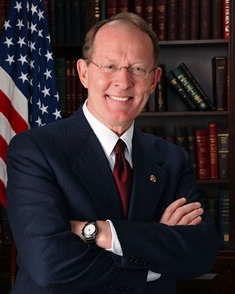By Lamar Alexander
United States Senator for Tennessee
There has never been a more exciting time in biomedical research in America than right now. We are talking about curing cancers, new medicines for diseases like cystic fibrosis, using 3D printing to help doctors replace knees, using 3D printing to construct drugs to treat epilepsy.
The House of Representatives completed its work on its 21st Century Cures legislation to streamline the medical device and drug approval process. The president announced his “cancer moonshot” to accelerate efforts to find cures, and has been pushing for his Precision Medicine Initiative to tailor cutting-edge treatments to the individual patient’s unique medical needs.
It’s time for the Senate to finish its work on our companion legislation to the House’s 21st Century Cures.
To that end, this week the Senate health committee, which I chair, kicked off the first of three committee meetings to debate, amend, and pass more than 50 proposals that should be of interest to every Tennessee family. The ultimate result of these important proposals will be that medicines and medical devices will be able to move safely and more quickly through the development and approval process so that they get into doctors’ offices and patients’ medicine cabinets faster.
At the Feb. 9 committee meeting, we passed seven pieces of bipartisan legislation unanimously, including one I cosponsored to improve the electronic health record system so that hospitals and doctors can more easily communicate on their patients’ behalf. The seven bills that will target therapies to patients with rare genetic diseases, streamline the review process for clinical trials, and help attract talented young scientists to the National Institutes of Health (NIH).
I discussed a proposal I’m thinking about that I call an NIH Innovation Projects Fund to focus on five top areas of exciting, ground-breaking, life-saving research.
The fund would focus on projects that require extraordinary, onetime support. In other words, they’re not long-term costs built into budgets. I have five areas of importance in mind.
First, the president’s “cancer moonshot.” We’re talking about actually curing some cancers, not just treating them.
Second, all of us are staggered by the anguish that Alzheimer’s and other brain diseases cause to individuals and their families. If we can revolutionize how we understand the human brain, we can find ways to help prevent or deal with brain diseases, saving money as well as people from suffering.
Third, starting an American Young Investigators Corps. Dr. Collins, the head of NIH, and many others have told my committee how important it is to ensure young investigators have enough money to do their research.
Fourth, Big BioThink awards. Each of the 24 institutes at NIH that fund grant awards would issue a challenge to the scientific community to identify biomedical mysteries or provocative questions that need to be addressed. The best ideas will be chosen and then the appropriate institutes will fund research projects to address those challenges.
And fifth, the president’s Precision Medicine Initiative to assemble one million human genomes. With this, a doctor can know a patient’s genome and know what the medicine they’re prescribing has done in other genomes. The doctor can make a very specific prescription, one that’s more likely to help and less likely to hurt.
The Senate health committee will hold two additional markups in March and April to consider the remainder of the bipartisan proposals. My expectation is that when we have finished considering the proposals in early April, they will add up to companion legislation to the House-passed 21st Century Cures legislation, and we can get a result this year. This is an important time for all Tennesseans who stand to benefit from this exciting time in medical innovation and research.






